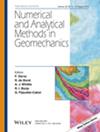Investigation on the Instability Mechanism of Expansive Soil Slope With Weak Interlayer Based on Strain Softening
Abstract
Expansive soils are widespread in the world and coincide with areas of high human activity. The main cause of deep instability of expansive soil slopes is due to their softening caused by excavation and seepage. By developing a comprehensive numerical model based on the theory of unsaturated soil, this study examines the characteristics of stress and displacement distribution of expansive soil slopes through hydraulic-mechanical coupled numerical simulation. This study analyzes the evolution patterns of slopes with excavation unloading and seepage of water storage to reveal the mechanisms of deep-seated instability of expansive soil slopes. The findings demonstrate that: The instability of expansive soil slopes begins at the foot of the slope and propagates along the interlayer, affecting the entire slope. Excavation leads to the softening of the expansive soil interlayer and the transfer of shear stress. During water storage, the weakening of the soil strength results in slope instability along the weak interlayer slip. Softening of the expansive soil interlayer facilitates the redistribution of shear forces in the slope and alters the distribution law of the plastic zone in the deep layer. Overly slowing down the slope leads to significant excavation unloading, which is detrimental to the slope's stability.

 求助内容:
求助内容: 应助结果提醒方式:
应助结果提醒方式:


